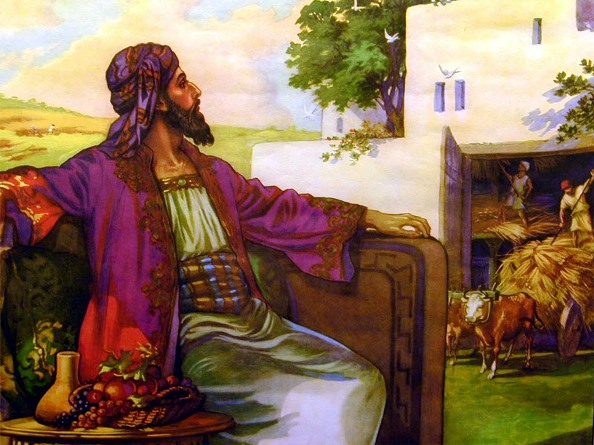DAILY MEDITATION: “Though one may be rich, one’s life does not consist of possessions”
Liturgical day: Monday of the Twenty-ninth Week in Ordinary Time
 Gospel text (Lk 12:13-21): Someone in the crowd said to Jesus, “Teacher, tell my brother to share the inheritance with me.” He replied to him, “Friend, who appointed me as your judge and arbitrator?” Then he said to the crowd, “Take care to guard against all greed, for though one may be rich, one’s life does not consist of possessions.”
Gospel text (Lk 12:13-21): Someone in the crowd said to Jesus, “Teacher, tell my brother to share the inheritance with me.” He replied to him, “Friend, who appointed me as your judge and arbitrator?” Then he said to the crowd, “Take care to guard against all greed, for though one may be rich, one’s life does not consist of possessions.”
Then he told them a parable. “There was a rich man whose land produced a bountiful harvest. He asked himself, ‘What shall I do, for I do not have space to store my harvest?’ And he said, ‘This is what I shall do: I shall tear down my barns and build larger ones. There I shall store all my grain and other goods and I shall say to myself, “Now as for you, you have so many good things stored up for many years, rest, eat, drink, be merry!”’ But God said to him, ‘You fool, this night your life will be demanded of you; and the things you have prepared, to whom will they belong?’ Thus will it be for the one who stores up treasure for himself but is not rich in what matters to God.”
“Though one may be rich, one’s life does not consist of possessions”
Fr. Lluc TORCAL Monk of Santa Maria de Poblet
(Santa Maria de Poblet, Tarragona, Spain)
Today, if we do not close our eyes and our ears, the Gospel’s clarity and directness will strike through us: “Take care to guard against all greed, for though one may be rich, one’s life does not consist of possessions” (Lk 12, 15). Where does man's life come from?
We know quite well where Jesus' life comes from, because He, Himself, has told us: “For just as the Father has life in himself, so also he gave to his Son the possession of life in himself” (Jn 5, 26). We all know that Jesus' life does not come only from the Father, but it also consists in abiding by His will, as the Father's will is the nourishment for Jesus, and it amounts to carrying out His work of salvation among men, by offering His life for His friends, which is the greatest sign of love. Jesus' life is, therefore, a life totally received from the Father and totally handed over to the same Father and, through the love to the Father, to all men. How can human life, therefore, be sufficient per se? How can it be denied that our life is a gift we have received and, because of that, if nothing else, we have to be grateful for it? “Nobody can claim to be the master of his own life” (St. Jerome).
Following this same logic, the missing question could only be: how can our life have any meaning at all if it is a life turned in upon itself, and is satisfied by saying: “Now as for you, you have so many good things stored up for many years, rest, eat, drink, be merry!” (Lk 12, 19)? If Jesus' life is a gift received and a gift always given with love, our own life —that we cannot deny we have also received— ought to become, following Jesus' life, a total gift to God and to our brothers, because “Whoever loves his life loses it” (Jn 12, 25).
Source: evangeli.net

